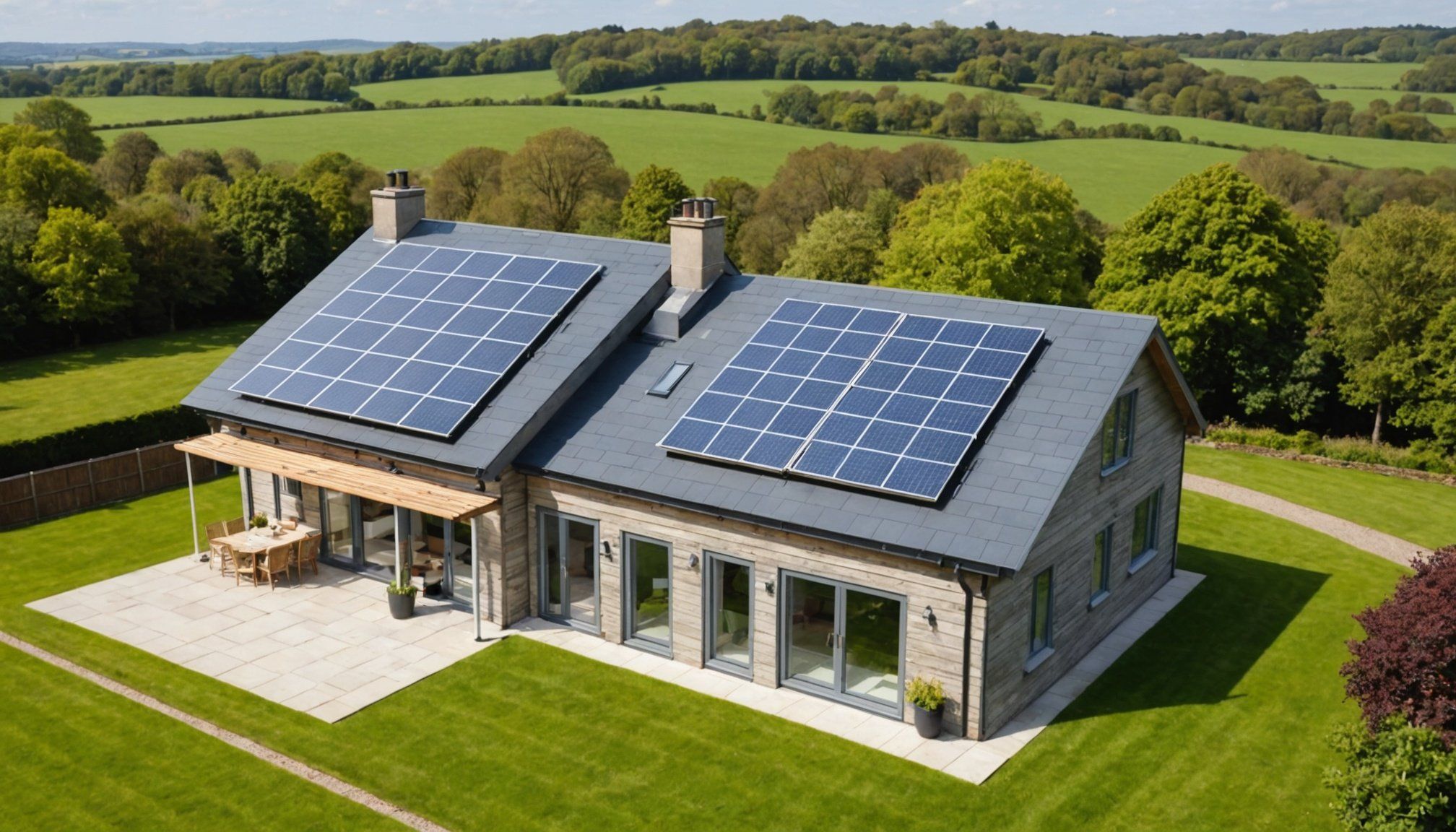Overview of Financing Options
Exploring financing options for renewable energy is crucial for any homeowner considering an investment in these systems. Various types of financing can make adopting renewable energy both feasible and beneficial.
Types of Financing Available:
In parallel : Mastering Property Maintenance Budgeting: Smart Strategies for Managing Costs on Your Large UK Estate
-
Loans: Homeowners can take advantage of both secured and unsecured loans tailored for renewable energy systems. Secured loans typically have lower interest rates but require collateral, while unsecured loans offer more flexibility.
-
Leases: Leasing a renewable energy system means you pay a monthly fee to use the equipment, often with the option to purchase. This can lower upfront costs considerably.
In parallel : Top UK Buy-to-Let Hotspots for Investment in 2023: Discover the Best Locations and Their Unique Advantages
-
Power Purchase Agreements (PPAs): With a PPA, the homeowner agrees to buy power generated by the renewable system installed on their property, often at a reduced rate compared to traditional utilities.
Understanding these options is vital because they can influence the overall cost and savings when investing in renewable energy. Some options might offer tax incentives or rebates, reducing the financial burden even further.
Key Benefits of Investing:
- Long-term cost savings on energy bills.
- Increased property value.
- Positive environmental impact, reducing carbon footprint.
These financing options for renewable energy provide means to not only fund renewable installations but also unlock significant advantages, making sustainable living both practical and rewarding.
Loans for Renewable Energy Systems
Transitioning to renewable energy not only benefits the environment but also helps in reducing energy costs over time. Financing this shift can be daunting, but renewable energy loans offer a viable solution for homeowners and businesses. There are several types of loans available specifically tailored for renewable energy systems.
Secured Loans
Secured loans are backed by collateral, typically your home, which can result in lower interest rates and longer repayment terms. This option can be particularly useful for substantial investments like solar panel installations or wind turbines. However, it’s crucial to consider the risk involved, as failure to repay may lead to the loss of your property.
Unsecured Loans
In contrast, unsecured loans do not require collateral and, therefore, are less risky. Though offering more flexibility, they often come with higher interest rates and shorter repayment terms. Unsecured loans might be suitable for smaller projects and those who prefer not to tie up their assets.
Green Home Improvement Loans
Green home improvement loans also support renewable energy projects, providing specialized terms and benefits. These loans often offer competitive interest rates and flexible repayment terms, making them an attractive option for homeowners interested in energy-efficient upgrades. When considering this type of loan, it’s important to evaluate eligibility requirements and the application process, weighing the pros and cons of different loan types to make an informed decision.
Grants and Incentives
Navigating the world of renewable energy grants and incentives is crucial for those considering an investment in sustainable technology. Governments worldwide offer a variety of grants to boost renewable energy investments, aiming to reduce dependency on fossil fuels and promote cleaner alternatives. These grants can significantly alleviate the financial burden on individuals and businesses by reducing upfront costs, making it easier to adopt eco-friendly solutions.
Eligibility criteria for these programs vary significantly depending on the specific incentive. Typically, they are tailored to different energy sectors, including solar, wind, and geothermal. Applicants may be required to meet specific conditions such as a minimum investment amount or adherence to regional sustainability guidelines. It’s essential to thoroughly review these criteria to ensure that your project qualifies for the available funding.
Utilising these grants effectively can diminish initial expenses, allowing for broader access to renewable technologies. By tapping into these resources, both individual and corporate investors can explore innovations while contributing to a greener planet. Prioritising renewable energy grants and incentives not only supports environmental goals but also fosters economic growth in the sustainable technology sector.
It is a pathway to a sustainable future that aligns economic development with environmental responsibility, driven by the power of government-backed incentives.
Comparison of Financing Solutions
Understanding your financing options is crucial when considering home improvements. Each option comes with its own set of advantages, costs, and requirements.
Cost Comparison
Evaluating total costs over time is essential. For homeowners, it’s important to compare not just the initial interest rates, but also additional charges like fees. Often, personal loans might offer higher rates than home equity loans but forego upfront fees, potentially making them cheaper in the short term. However, home equity loans might prove more beneficial if you’re focused on lower monthly payments over a longer period.
Application Process Comparison
The differences in application procedures can significantly impact your choice. Personal loans usually involve a straightforward process with minimal documentation. In contrast, home equity loans require more paperwork as they are secured against your property, often necessitating an appraisal. Understanding these procedures and your ability to meet them is critical in decision-making.
Long-term Benefits
Analyzing the impact of your financing choice on long-term savings is pivotal. While personal loans offer flexibility and speed, home equity loans might provide tax benefits in some regions, enhancing overall savings. Over time, the chosen financing option can affect your financial health, making it essential to consider future costs and savings thoroughly.
Case Studies and Expert Insights
Exploring renewable energy investment through real-life examples provides insightful learning opportunities for UK homeowners. Among these examples are homeowners who harnessed financial solutions to transform their energy usage successfully. Such examples reveal how tailored financing models can significantly impact project viability and sustainability.
Consider the Smith family in London, who opted for a specialised financing solution to install solar panels. They leveraged government incentives and a green loan, allowing them to cover upfront costs without financial strain. Their case exemplifies how informed financial decisions can enhance the feasibility of eco-friendly projects.
Experts frequently emphasize the significance of choosing the appropriate financing model. Dr. Jane Thompson, an energy consultant, highlights that understanding one’s energy goals is crucial. “Assess your long-term savings objectives and immediate budget constraints to find a model that aligns with your needs,” she advises.
From these examples, we learn valuable lessons crucial for renewable energy investment success:
- Thorough research on financial aid options is essential.
- Long-term benefits should outweigh initial costs.
- Collaborating with expert consultants can provide tailored advice and strategy.
These insights underscore the practicality of renewable energy investment case studies in guiding homeowners toward savvy financial strategies and sustainable energy solutions.
Resources and Tools
When exploring renewable energy financing options, it’s essential to utilize a variety of resources and tools. These can assist in determining the best strategies for investing in sustainable energy.
Useful Links to Government and NGO Programs
Access to government and NGO programs is invaluable for homeowners embarking on renewable energy projects. These programs can provide financial assistance and expert guidance. Look for established entities that offer grants, low-interest loans, or tax incentives, as they can significantly reduce initial costs and make projects financially viable.
Financing Calculators
To assess personal financing options effectively, financing calculators are indispensable tools. They allow users to input specific data, such as energy consumption and project costs, to estimate financial outputs like savings and payback periods. These tools help you better understand your financial commitments and returns, empowering informed decision-making.
Community Assistance Programs
Community engagement can play a crucial role in supporting renewable energy endeavors. Many community assistance programs offer platforms for shared experiences and collective learning, providing peer support and collaborative opportunities. This comprehensive support network helps navigate the complexities of renewable energy investments.
By leveraging these renewable energy financing calculators and resources, you’ll be equipped to make more informed and confident choices in your journey toward sustainable energy solutions.











